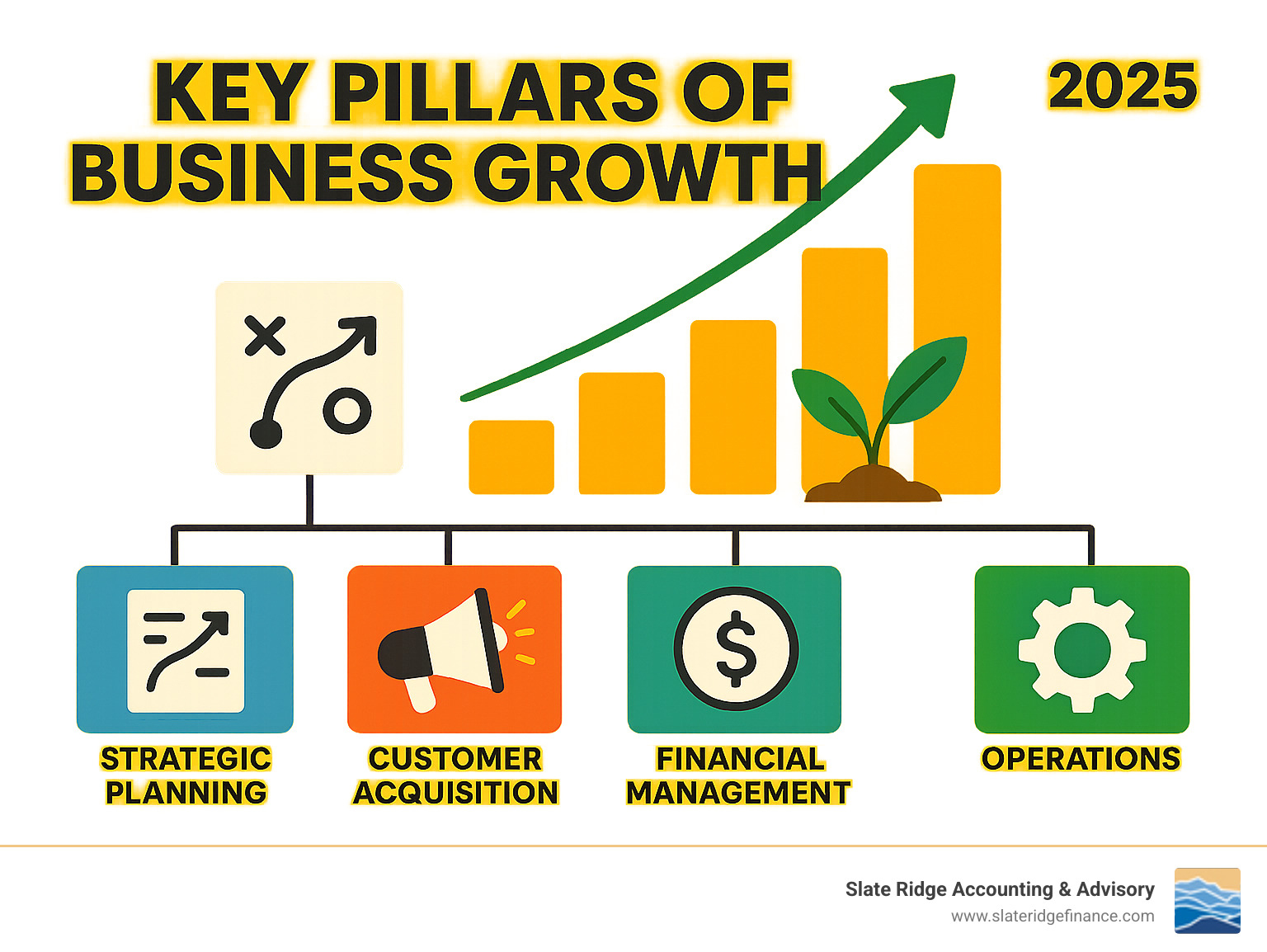Why Growing Your Small Business Requires a Strategic Roadmap
Learning how to grow small business operations is an exciting yet challenging phase for any entrepreneur. While expansion brings visions of increased revenue, the reality is that over 70% of small businesses are single-employee operations.
Quick Answer: How to Grow Your Small Business
- Document your processes - Create systems that can scale with your growth
- Focus on customer retention - It costs 5x less than acquiring new customers
- Reinvest profits strategically - Fund growth initiatives rather than immediate rewards
- Build a sales funnel - Guide prospects from awareness to purchase systematically
- Delegate effectively - Avoid micromanagement to focus on strategic planning
- Track key metrics - Monitor cash flow, customer acquisition costs, and profit margins
- Create a growth plan - Set clear goals with timelines and responsibilities
The journey from solopreneur to scaling business owner isn't about working harder—it's about working smarter. As one SBDC professional noted, "Growth requires a disciplined, planned approach to minimize mistakes." Without it, businesses risk "runaway growth"—expanding so quickly that operations become chaotic, cash flow suffers, and success becomes a threat to survival.
This guide will walk you through the essential strategies for sustainable scaling. You'll learn how to build a foundation for long-term success and avoid the common pitfalls that derail promising ventures.

Understanding the Stages of Business Growth
Think of growing a business like a plant developing from seed to bloom. Each stage has unique needs and challenges. Understanding these growth phases helps you grow small business operations more strategically.
This phased approach is a practical framework that helps you steer through the challenges of expansion. By knowing what to expect, you can prepare for what's coming and avoid common mistakes.
Stage 1: Startup and Survival
This first stage is about one thing: financial survival. You're working to find your first customers and establish a market presence. Cash flow management is a daily obsession, as one late payment can feel like a crisis.
Stay flexible and listen to customer feedback. The Lean Startup methodology is valuable here, emphasizing rapid learning and adaptation based on real-world results.
Don't try to perfect everything. Instead, focus on validating your market and finding the point where customers are willing to pay for your offer. This stage is about testing, learning, and iterating until you find what works.
Stage 2: Early Growth and Stabilization
Congratulations, you've survived. Now, the challenge is managing increased demand and learning to grow small business operations systematically. This stage often brings your first employees, which means learning the art of delegation. It's tempting to do everything yourself, but that approach quickly becomes a bottleneck.
Documenting your processes is critical. Think of it as building the instruction manual for your future success. Every process you document today is one less thing you'll have to personally handle tomorrow.
A crucial mistake here is taking bigger paychecks instead of reinvesting profits. This stage requires investment in systems, marketing, and people to fuel continued growth. Process improvement is your new best friend; ensure you're running efficiently before you scale up further.
At Slate Ridge Accounting & Advisory, we see many businesses at this stage. They need help setting up proper financial systems to make smart investment decisions. Our virtual accounting services are designed to support growing businesses through this critical phase.
Stage 3: Expansion and Maturity
Your business is now established, profitable, and ready for significant expansion. Strategic leadership becomes your most important skill.
The biggest challenge is learning to delegate without micromanaging. Empower your team to make decisions. If you're still the bottleneck for every decision, you're not ready for serious expansion.
Maintaining your company culture becomes increasingly important as you add more people to the team. The values that got you this far need to be intentionally cultivated.
This stage opens up possibilities like entering new markets or expanding service offerings. But remember, it's about smart growth, not just growth for growth's sake. Every expansion decision should be evaluated based on its effect on profit margins and overall business health.
Businesses that thrive here have mastered the fundamentals: solid financial management, documented systems, and strong leadership. They're not just getting bigger—they're getting better.
Core Strategies to Grow Your Small Business
To grow small business ventures successfully, you need smart, targeted strategies that expand your reach while maximizing customer value.

Attract and Retain More Customers
A well-designed sales funnel guides people from awareness to loyalty, ensuring you nurture every potential customer. Many owners focus on acquisition, but customer retention is significantly cheaper—about 5 times less expensive than finding new ones.
Smart loyalty and referral strategies make customers feel valued for coming back. Happy customers can become your best salespeople.
Build genuine loyalty through exceptional service. Personalize communication, seek feedback regularly, and create a sense of community through social media or events to make customers feel like they belong to something bigger than just a transaction.
Amplify Your Reach with Digital Marketing
Digital marketing is essential for growth, leveling the playing field and allowing small businesses to compete with larger companies.
Social media marketing can be powerful when done authentically. The key isn't perfection; it's consistency and genuine connection. Whether you're using Facebook, LinkedIn, or TikTok, focus on showcasing your brand's personality.
Email list building remains one of the highest-ROI marketing strategies. Since most people need multiple touchpoints before buying, direct access to their inbox is invaluable.
Content marketing and SEO basics are long-term investments that build authority and drive organic traffic. By understanding your competitors, you can identify opportunities to stand out. This organic approach often provides the most sustainable results.
At Slate Ridge Accounting & Advisory, we help businesses track their marketing ROI. Learn more about our professional services expertise and how we can help you measure what matters.
Forge Strategic Partnerships and Alliances
Strategic partnerships can fast-track your growth by connecting you with established audiences and complementary businesses.
Local business collaboration creates win-win situations, like a salon partnering with a jewelry store for cross-promotion. These relationships expand your reach without expanding your marketing budget.
Joining supply chains of larger companies can provide steady revenue and growth opportunities.
Networking events and professional relationships remain valuable. Face-to-face connections at chamber of commerce meetings or industry conferences often lead to unexpected opportunities. Building these partnerships takes time, but the payoff can be substantial.
Building a Foundation for Sustainable Growth
As you expand, your business's internal mechanics become as important as external strategies. Sustainable growth means getting stronger and more efficient, not just bigger. Without a solid foundation, rapid growth can lead to chaos.

Master Your Finances for Scalability
Financial management is the backbone of sustainable growth. It's not enough to make money; you must manage it wisely to fuel future success.
Reinvesting profits is a powerful strategy. Instead of taking all profits for personal use, strategically allocate funds for equipment, marketing, or hiring. This is "smart growth"—ensuring every opportunity maintains or improves profit margins.
Managing cash flow is critical as you scale. Track your Key Performance Indicators (KPIs) religiously. Metrics like customer acquisition costs and gross profit margin help you make informed decisions.
Financial forecasting and budgeting become necessities. They help you plan for future expenses and revenue, ensuring you have capital when opportunities arise.
At Slate Ridge Accounting & Advisory, we help businesses track KPIs and forecast growth with clarity. Don't let common financial misconceptions hold you back—learn about 3 Bookkeeping Myths That Could Be Costing You Money.
Optimize Operations and Document Everything
Process documentation is crucial. As you grow small business operations, maintaining consistency becomes challenging without clear systems. Documentation creates a playbook for your business, making training, delegation, and quality control easier.
Creating systems and leveraging technology is a game-changer. CRM software helps track customer interactions and improve sales processes. Systematizing routine tasks frees up time for strategic growth initiatives.
Process improvement and quality control follow naturally from documented systems. You can identify bottlenecks, streamline workflows, and ensure a consistent, high-quality customer experience.
Lead Your Team and Avoid Common Pitfalls
As you grow, your role shifts from doer to leader. You must guide and empower your team.
Effective delegation means hiring capable people and trusting them. Avoiding micromanagement is crucial; it stifles your team's confidence and ownership.
Strategic hiring becomes increasingly important. Bring in people with the right skills, experience, and cultural fit, especially for supervisory roles.
Maintaining company culture as you grow keeps your team engaged and productive. The values that made you successful must be intentionally preserved.
Finally, time management for yourself as a leader is essential. Step back from daily operations to focus on the big picture: strategic planning, relationship building, and identifying new growth opportunities.
Securing Resources and Funding for Expansion
To grow small business operations, you need capital. Understanding your funding options, whether you're in Raleigh or Wilmington, NC, is key to smart growth and avoiding financial stress. The good news is you have more options than you might think.

Fueling Growth: Reinvesting Profits vs. Seeking Funding
Once you're consistently profitable, you face a classic dilemma: reward yourself or reinvest in the business?
Bootstrapping through reinvestment means funneling profits back into upgrades, marketing, or hiring. It's a conservative approach that keeps you debt-free and in control, but growth can be slow.
Seeking external funding is like hitting the accelerator. A loan can provide the cash for a big purchase, debt consolidation, or working capital. You can move faster, but you'll have payments and lender requirements.
The choice depends on your risk tolerance and how quickly you need to move.
| Feature | Reinvesting Profits | Seeking Loans |
|---|---|---|
| Source of Funds | Internal earnings | External lenders (banks, financial institutions) |
| Control | Complete control over funds and business decisions | May involve lender conditions or reporting requirements |
| Risk | Lower financial risk (no debt repayment) | Higher financial risk (debt obligations, interest) |
| Speed of Growth | Slower, dependent on profit accumulation | Faster, can provide large sums quickly |
| Cost | Opportunity cost of not taking personal income | Interest payments, fees |
| Availability | Dependent on profitability | Dependent on creditworthiness, business plan |
How to successfully grow your small business with external financing
If you seek external funding, preparation is key. Lenders want a solid business plan with realistic financial projections. Show them how you'll use the funds to generate growth and ensure repayment, backed by industry knowledge and revenue forecasts.
SBA loans are often the gold standard, offering favorable terms because they are partially government-guaranteed. They can be used for working capital, equipment, or real estate.
The application process itself helps create a roadmap for your growth.
For our Canadian readers, similar programs exist through the Canada Small Business Financing Program and the Business Development Bank of Canada (BDC) loans.
Tapping into Support Systems and Mentorship
You don't have to figure this out alone. An entire ecosystem of support exists to help small businesses succeed.
Small Business Development Centers (SBDCs) offer free consulting, from loan application assistance to growth planning. Their professionals can help you avoid common pitfalls.
Industry associations are goldmines for networking and specialized knowledge.
Finding a mentor who has successfully scaled a business can be life-changing. They provide perspective when you're too close to a problem. Local chambers of commerce in places like Hickory, NC, or Morganton, NC, are great places to start building these relationships.
The support is out there. Find your local SBDC and start building your support network today.
Frequently Asked Questions about Growing a Small Business
We hear the same concerns from business owners about timing, readiness, and what really matters when you're trying to grow small business operations. Let's explore the most common questions.
How quickly should a small business grow?
Faster isn't always better. "Runaway growth," as one SBDC professional calls it, can be as dangerous as stagnation, risking stretched resources, compromised quality, and cash flow nightmares.
Aim for sustainable growth—a pace where you can maintain or improve profit margins while keeping your team and customers happy. The right pace varies by industry. Watch your resource capacity: can your people, systems, and cash flow support the increased demand? If you're already scrambling, it's time to strengthen your foundation first.
How do I know if my business is ready to grow?
This is a critical question. Growth without readiness rarely ends well. Key signs that you're ready include:
- Consistent profitability: You're not bouncing between profit and loss.
- Strong customer demand: You have more inquiries than you can currently handle.
- Stable cash flow: You can predict income and expenses and have working capital for bumps in the road.
- Documented systems: Your operations don't depend solely on you.
- Team readiness: Your current team is ready for more, or you have a plan to hire the right talent.
What is the most important factor to grow your small business?
One factor makes or breaks growth more than any other: strategic planning. Without a clear roadmap, you're driving blind. Your growth plan doesn't need to be a 50-page document, but it must answer: Where are you going? How will you get there? What resources do you need?
This planning process aligns your finances, marketing, operations, and team. Businesses that struggle often "wing it," while those that thrive have a simple plan they follow. Failing to plan is planning to fail.
At Slate Ridge Accounting & Advisory, we help create the financial backbone for growth. With clear visibility into your numbers, strategic planning becomes much more effective.
Conclusion: Your Next Steps to Smart Business Growth
Growing your small business doesn't have to be overwhelming. This guide provides a roadmap for changing your operation into a scalable enterprise, from understanding growth stages to implementing core strategies. The key is a staged, methodical approach.
Sustainable growth is better than rapid, chaotic expansion. Your financial foundation remains the backbone of everything. Without proper cash flow management, KPI tracking, and strategic reinvestment, even the best marketing efforts can fall short. This is where the right financial partner makes all the difference.
At Slate Ridge Accounting & Advisory, we've seen countless businesses successfully grow small business operations by focusing on clear financial insights, strategic planning, and expert guidance. Our cloud-based approach provides modern, personalized financial solutions custom to your industry.
Don't let financial uncertainty slow your growth. Successful businesses partner with experts for clarity on their numbers, growth forecasting, and scalable financial systems.
Your next step is simple: get your financial house in order so you can focus on what you do best—growing your business. We're here to handle the complex financial details while you build your dream.
Explore our Virtual Accounting Services for Small Businesses
Ready to get started?
Book a free consultation today and let’s explore how Slate Ridge can support your business with expert accounting that’s accurate, timely, and built around your goals.






